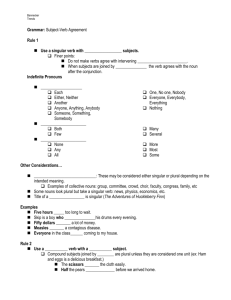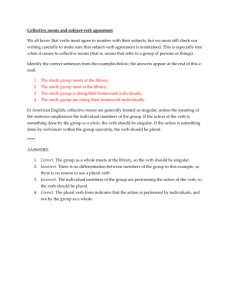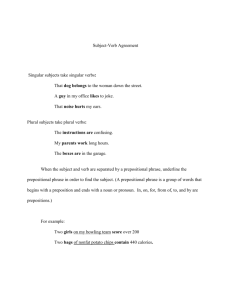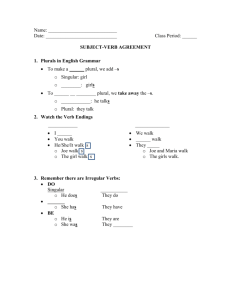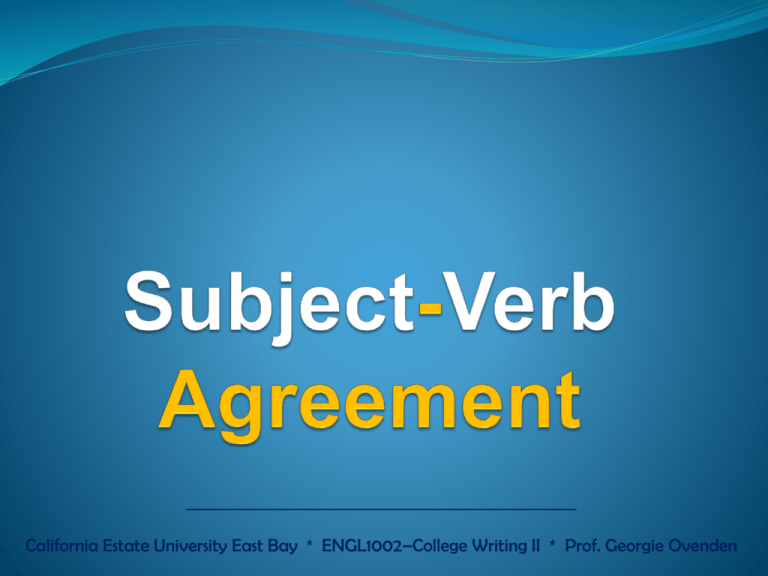
_________________________________________________________________
California Estate University East Bay * ENGL1002–College Writing II * Prof. Georgie Ovenden
CONTENTS
1. Singular and Plural Subjects
2. What is Subject-Verb Agreement?
3. When does lack of Subject-Verb Agreement happen?
4. Buried Subjects
5. Compound Subjects
6. Or and Either/Or Subjects
7. Clauses and Phrases as Subjects
8. Indefinites as Subjects
9. Collective Nouns and Amounts as Subjects
10. Plural Words as Subjects
11. Titles, Company Names, Words, and Quotations as Subjects
12. Linking Verbs
13. There (is/are), Here (is/are), and It
14. Who, Which, That and One of as Subjects
1. Singular and Plural
1
Subjects
In any sentence, look for the subject. Is it singular or
plural? That will help you determine the verb ending.
SINGULAR
For singular nouns, pronouns, and nouns that cannot
be counted (i.e. news, time, happiness), use verbs in
singular.
I chew.
Water drips. Time flies. You laugh.
PLURAL
For plural nouns and pronouns, use verbs in plural.
We know.
1. (Harris, 53)
The cups are clean. They stretch.
HINT
Finding
The Subject
and Verb
1. Identify
verb
HINT
Finding
The Subject
and Verb2
2. Beware of
distracters
2. (Harris, 54)
2. What is Subject-Verb
Agreement?
“Subject-Verb Agreement
is a grammatical rule
that requires a verb
to agree in number
with the subject” (Carlin, n.p.).
For example, a singular subject
must take a singular verb
and if the subject is plural
its verb must be in plural form.
Image: NIU - Northern Illinois University . Web.
2. What is Subject-Verb
Agreement? - Continued...
The subject and verb have to match in number to each
other. When the subject is singular then the verb must
become singular. If the subject is plural, then the verb
must become plural.
When you make a verb into a plural or singular it all has to
do with the letter “s”. If the subject is singular, add an “s” to
the end of the word. When the subject is plural then don’t
add the “s” at the end of the verb. This is where the
common mistakes come in.
Tony works at the mall.
They work at the mall.
HINT
Subject-Verb
Agreement
3. (Harris, 53)
3. When does lack of SubjectVerb Agreement happen?
Subject-Verb Agreement can be rather difficult to
identify due to the variation of subjects and verbs used
in a sentence.
If we mistakenly pair a singular subject with a verb that
is in plural form then we lack Subject-Verb Agreement.
Image: Kansas.com Blogs. Web.
4. Buried Subjects
More complex phrases have several other words besides the
main subject, which separates the subject and verb. Sometimes
in between the subject and the verb there is a phrase, but the
verb still has to agree with the subject. When you find this,
ignore “prepositional phrases; modifiers; who, which, and that
clauses;” and those other words that do not belong to the main
idea (Harris, 53).
The ceiling, as well as the wooden floors and the wall, need repair.
SUBJECT
VERB
The ceiling, as well as the wooden floors and the wall, needs repair.
SUBJECT
VERB
[As the subject is the ceiling and not the floors,
the writer must make the verb singular not plural.]
HINT
The “It”
and “They”
Technique
EXERCISE | The “It” and “They”
Technique
“IT”
“THEY”
Which verb sounds correct?
Which verb sounds correct?
Mary (makes, make)
Mary and Tom (walks, walk)
a great sandwich.
It (makes, make) a great
sandwich
to the park.
They (walks, walk) to the park.
EXERCISE | The “It” and “They”
Technique
“IT”
“THEY”
CORRECT:
CORRECT:
Mary and Tom
walk to the park.
Mary makes
a great sandwich
[Mary is singular so you
must make the verb
singular which means
adding an "s"
to the end of the verb.]
[Mary and Tom are plural
so you must make the verb
plural.]
5. Compound Subjects:
When two or more words, or phrases are joined together
by “and” or “nor.” If you use “and” to connect two or more
nouns or pronouns, use a plural verb. (B and C = plural.)
The mother and daughter share a close friendship.
SUBJECT
VERB
However, do not use plural if the compound subjects are
used as one element, use instead a singular verb.
The garden and the flowers is what I care about most.
6. Or and Either/Or in
Subjects
Use a singular verb when two singular subjects are
joined by the words or or nor.
The teacher or the girl wants to write on the board.
Use a verb that agrees with the closer subject word
when the subjects are a plural and a singular noun and
are joined by “or or either...or, neither...nor, or not only...but
also” (Harris, 54).
Neither red bulbs nor a black screen was allowed in this room.
Not only the kid but also his toys are back in the yard.
7. Clauses and Phrases
as Subjects
Use a singular verb if the subject is built by the whole
phrase/clause.
The book I want to buy is too expensive.
Use a plural verb if the verb is a form of the verb be and its
complement or the noun after the verb is also plural.
What they wanted were millions of cushions of color.
[What they wanted = millions of cushions]
8. Indefinites as Subjects
Use a singular verb for “indefinite words with singular meanings, such as
each, every and any” that are used as the subject word or when they precede
it (Harris, 55).
Each wants something different.
Each kind of animal has an interesting biology.
Sometimes, other indefinite words such as none, some, most or all, are used
as the subject word (55). In these cases, Use a verb according to the
meaning of the subject.
None of the students is asking questions.
[None of the students is the subject of the sentence.
It is used here as one unit, so you have to use a singular verb.]
Most of the students are tired now.
[Most of the students refers to multiple persons,
so you have to think of it as plural subject with a plural verb (55).]
Definition
Collective
Nouns
9. Collective Nouns
and Amounts as Subjects
Although it is less common, you can use of the collective
noun referring to members/items as separate
individuals. Use a plural verb in these cases.
The family are disagreeing with each other’s ideas.
Use a singular verb when you name an amount in the
subject.
Hundred dollars is enough.
Two stacks is plenty.
Usually 12 miles is what I run every day.
10. Plural Words as
Subjects
A sentence can have both a singular subject and also a
plural subject when it is joined by and or nor. This is where it
can get confusing, how do you know which verb to use? In
such case, make the verb agree to the nearest subject.
The dirt and dust particles pose a threat to your new furnace.
When words are considered a single unit they take on a
singular verb. Subjects like physics and news end with –s but
are considered a single subject.
The news is interesting.
11. Titles, Company Names,
Words,
and Quotations as Subjects
Another common mistake is when talking about a company.
People will try to refer to a company as “they”, when they
should be referring to it as “it”. A company is considered
singular and not plural. Use a singular verb.
Safeway has a strong team. It treats the employees like family.
SUBJECT
When the subject is a title, company, term, or quote the verb
should be singular even though the subject ends with an –s.
All the King’s Men is a good book.
Lowes is open today.
“Apples for the teacher!” is what the boy said.
12. Linking Verbs
When a sentence has a linking verb, the verb agrees
with the subject and not the words that follow the verb.
Her solution is to fix the papers.
Big words are hard to pronounce.
13. There (is/are),
Here (is/are), and It
When a sentence begins with there or here, the verb
will agree with the subject that follows the verb or the
complement.
There is an exciting new book to read.
There are too many books to read.
Here walks the evil spirit.
Here walk the ghosts.
When it is the subject it always takes a singular verb
even when a plural verb follows.
It was ducks in the pond that quacked at my friends.
14. Who, Which, That
and One of as Subjects
When the subject is who, which, or that, the verb agrees
with the antecedent or the word before the verb.
This is the tree that has more limes.
Those are the girls who have emphysema.
14. Who, Which, That
and One of as Subjects –
Continued...
You must decide if a verb should be singular or plural
when dealing with phases like one of those who/which/that.
First you decide if the who, which, or that refers to a group or
just one person, then make the verb agree with that subject.
Betty is one of those singers who sing only on the weekends.
[In this sentence, Betty is part of a large group, singers who sing
only on the weekends acts like others in that group.
Therefore, who takes a plural verb because it refers to singers.]
Sour dough bread is one of the breads that smells good.
[Sour dough bread is part of a group of breads; but in this case,
the this bread smells good and the other breads may.
Therefore, that refers to that one bread and takes a singular verb.]
15. Don’t vs. Doesn’t
The word doesn’t should be used with a singular
subject.
The boy doesn’t talk to his friend.
The word don’t should be used with a plural subject.
Girls don’t like boys.
16. Someone, somebody…
The words someone, somebody, anybody, nobody,
anyone, everyone, either, each, each one, no one, and
neither should be used with a singular verb.
Everyone need time to play.
Everyone needs time to play.
Remember…
Subject-Verb
Agreement
occurs when
the subject
and verb
endings agree
in number
and person
(Harris, 52).
Image: Jose Carrillo’s English Forum. Web.
Works Cited
Carlin, Susan E. “Subject-verb Explanation.” Electronic
Educational Environment. UC Irvine. Web. 29 Nov. 2011.
<https://eee.uci.edu/programs/esl/svlink.html>.
Harris, Muriel. “3 - Revising Sentences for Accuracy, Clarity, and
Variety.” Prentice Hall Reference Guide. 6th ed. Upper Saddle
River, NJ: Pearson | Prentice Hall, 2006. 52-59. Print.
Marshall, Pam. "Subject Verb Agreement." K12 Reader: Reading
Instruction Resources for Teachers and Parents. n.p., 2011. Web.
21 Nov 2011. <http://www.k12reader.com/subject-verbagreement / >.
Works Cited
IMAGES:
“Effective Writing Practices Tutorial - Subject – Verb
Agreement.” NIU - Northern Illinois University - Learning
Today, Leading Tomorrow. Web. 29 Nov. 2011.
<http://www.niu.edu/writingtutorial/grammar/agreement01.
h tml>
McLendon, Lisa. "Agreement | Grammar Monkeys | Wichita
Eagle Blogs." Kansas.com Blogs » An Index to Wichita Eagle
Blogs, plus a Feed of All Blog Posts. Web. 29 Nov. 2011.
http://blogs.kansas.com/grammar/tag/agreement/
"Subject-Verb Agreement?" Jose Carillo's English Forum.
Web. 29 Nov. 2011.
http://josecarilloforum.com/forum/index.php?topic
=240.30


